Key takeaways:
- Flexibility transforms challenges into opportunities, fostering creativity and joy through adaptability.
- Recognizing common pitfalls in planning, such as poor communication and unrealistic expectations, can help us shift our mindset towards resilience.
- Calmly assessing situations and focusing on core objectives enables effective problem-solving and meaningful experiences during setbacks.
- Learning from setbacks enhances resilience and sparks creativity, emphasizing the value of collaboration and open communication in navigating changes.
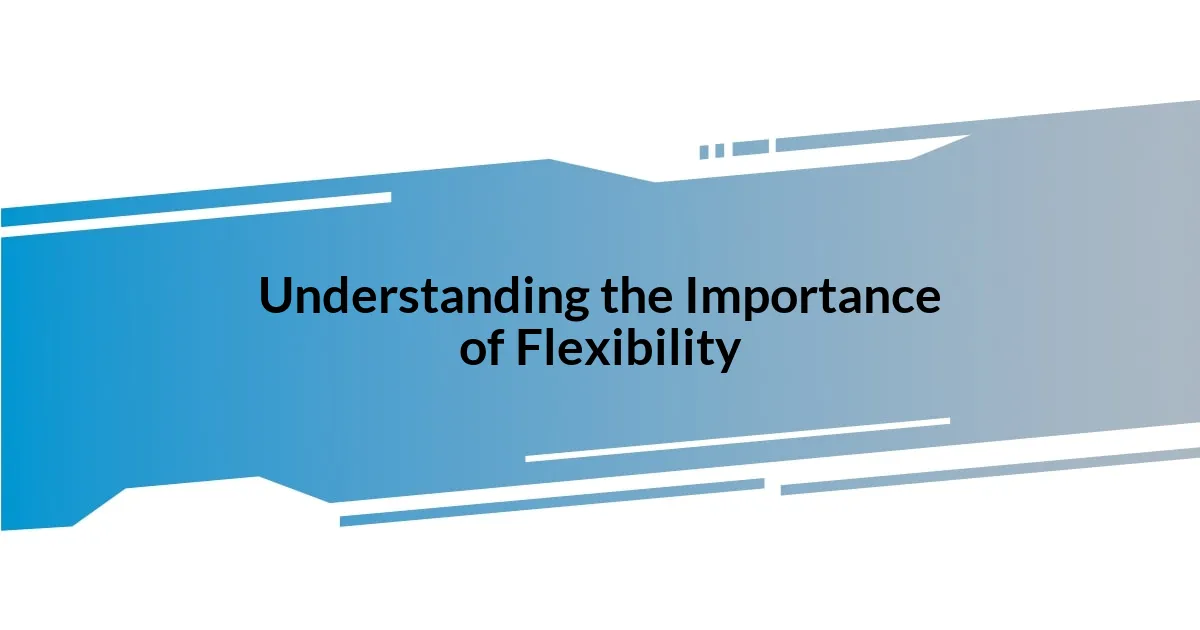
Understanding the Importance of Flexibility
Flexibility is a vital skill that helps us navigate unexpected changes in our plans. I remember a time when I had meticulously organized a weekend getaway, only for a sudden storm to cancel our outdoor activities. Instead of feeling defeated, we pivoted to an impromptu game night indoors. It was one of the most memorable experiences! Doesn’t it make you wonder how often we miss out on joy because we cling too tightly to our initial plans?
When we embrace flexibility, we open ourselves up to new possibilities and experiences. For instance, there was a work project that didn’t go as planned, leading to an unanticipated brainstorming session. What emerged were innovative ideas that propelled the project forward, ideas I wouldn’t have considered had I been rigid. Have you ever experienced a moment where a detour ended up being the best part of your journey?
Adapting to change not only eases stress but can also spark creativity. I’ve found that when I allow myself to go with the flow, I discover alternative solutions that I might have overlooked. Isn’t it fascinating how a simple shift in perspective can turn a challenging situation into an opportunity for growth? Flexibility isn’t just a reaction; it’s an active choice that enriches our lives.
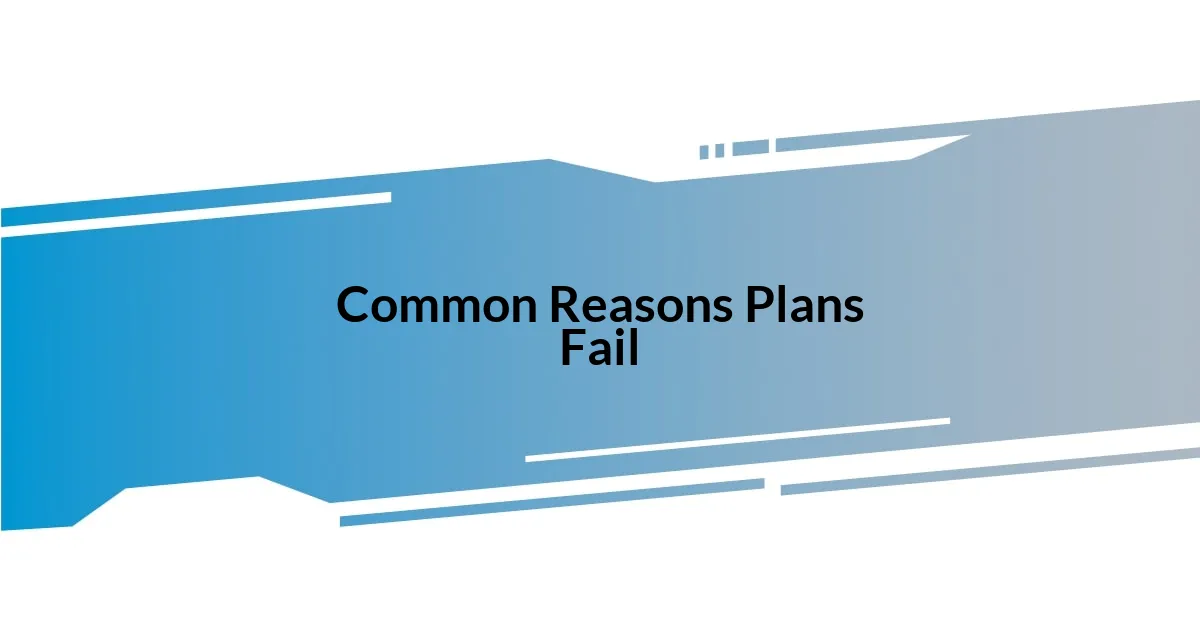
Common Reasons Plans Fail
When I reflect on why plans often go awry, a few common culprits come to mind. Sometimes, it’s simply a lack of foresight. I remember planning a road trip without considering the potential for road closures due to construction. We hit a snag that delayed us for hours, forcing us to adjust our itinerary on the fly. Understanding that unpredictable elements can derail our plans helps us mentally prepare for the unexpected.
Here are some more reasons plans can fail:
- Poor communication: Misunderstandings can lead to everyone heading in different directions.
- Unrealistic expectations: Hoping for the perfect outcome without accounting for real-life variables can lead to disappointment.
- Inadequate preparation: I once dove into a group project without fully grasping my role, leading to chaos and confusion.
- External factors: Weather, unexpected events, or even someone getting ill can dramatically affect our plans.
- Resistance to change: Sticking too rigidly to a plan can blind you to new opportunities that arise.
Recognizing these pitfalls can shift our mindset, turning potential failures into learning experiences. After all, life is about adapting and finding joy in the journey.
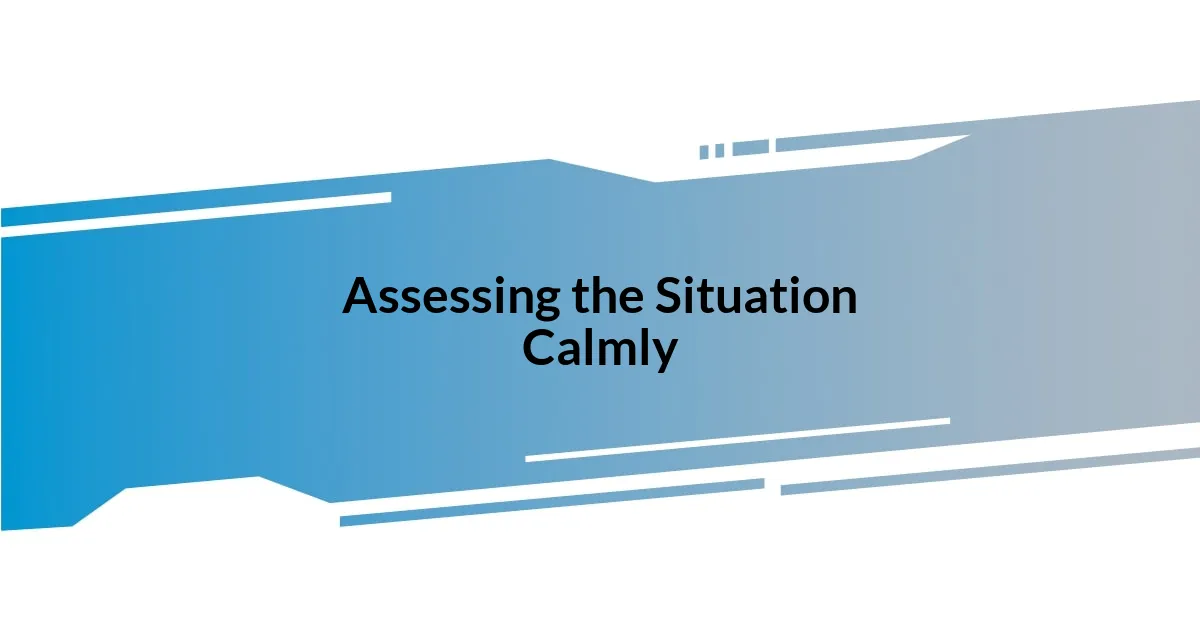
Assessing the Situation Calmly
When plans go awry, my first instinct is to take a deep breath and assess the situation calmly. Staying composed can significantly impact how I navigate challenges. I recall a time when a crucial meeting was canceled last minute, and my initial reaction was frustration. However, after I paused for a moment and evaluated my options, I used that time to gather more insights and refine my ideas, which ultimately made the next meeting more productive than it would have been.
Part of assessing the situation means identifying the root cause of the disruption. I’ve learned this through experience; during a family reunion, our reservation at a restaurant fell through. Instead of panicking, we took a moment to re-evaluate our choices. By discussing what we all wanted – pizza or barbecue – the entire family found joy in cooking together at home instead. This not only turned the mishap into a memory but helped strengthen our bond.
When assessing a situation, I’ve found it helpful to create a quick pros and cons list. You can simplify complex emotions and ideas into manageable bits of information. For instance, during a recent project delay at work, I listed the advantages of pushing the deadline versus the drawbacks. This exercise clarified my mind, allowing me to communicate better with my team and strike a balance between urgency and quality without getting overwhelmed.
| Situation Type | Calm Assessment Steps |
|---|---|
| Unexpected Meeting Cancellation | Reflect, Gather Insights, Reorganize Objectives |
| Family Reunion Restaurant Cancellation | Evaluate Options, Discuss Preferences, Adapt Together |
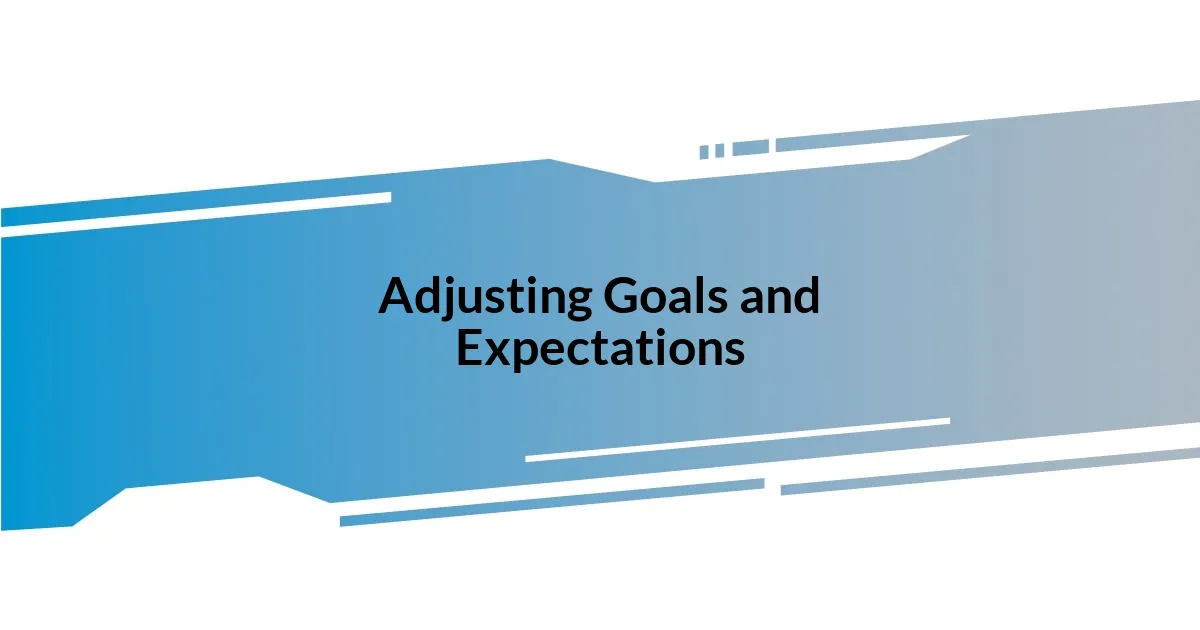
Adjusting Goals and Expectations
When I find myself needing to adjust my goals and expectations, it often feels like a gentle tug at my heartstrings. I recall once setting my sights on a fitness goal, aiming to run a half marathon within a specific timeframe. As I trained, I faced an injury that sidelined me. It was tough at first, but I had to remind myself that progress isn’t always linear. Instead of fixating on the initial goal, I adjusted my expectations and focused on recovery. This shift not only improved my mental outlook but allowed me to come back stronger and enjoy the journey.
It’s interesting how our preconceived notions can shape our plans. I remember organizing a charity event with ambitious fundraising goals. When attendance was lower than anticipated, I felt the disappointment creep in. However, rather than dwell on what might have been, I chose to recalibrate my expectations. I celebrated the funds we did raise and redirected my energy toward building community connections instead. This experience taught me that sometimes, the outcome may not meet our original vision, but that doesn’t diminish its value.
Have you ever found yourself in a situation where expectations clash with reality? I certainly have. During a family vacation, the weather turned sour, dashing our hopes of outdoor adventures. Instead of allowing frustration to take over, my family and I pivoted to plan a cozy game night indoors. In that moment, I realized that adjusting our goals could lead to unexpected joy. It’s a reminder that flexibility isn’t just about survival; it can also lead to delightful surprises along the way.
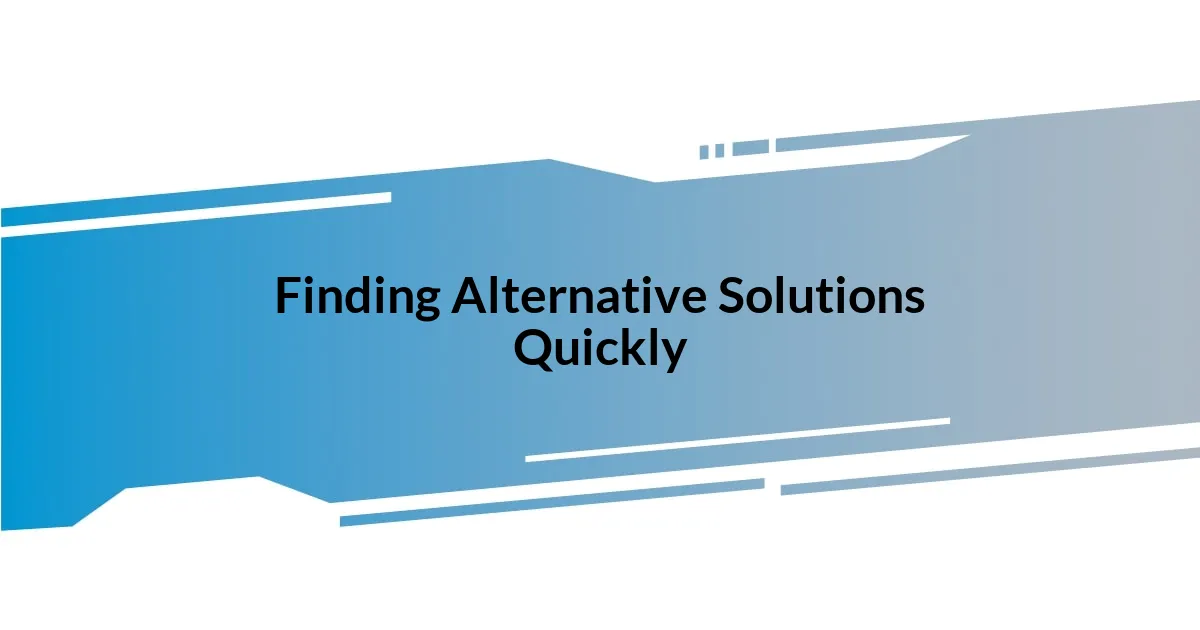
Finding Alternative Solutions Quickly
It’s amazing how quickly we can find alternative solutions when we embrace a mindset of flexibility. Once, during a weekend trip, our planned hiking adventure was thwarted by sudden rain. Initially, I felt disappointment creeping in—after all, I’d been looking forward to that escape into nature! But instead of sulking, I gathered my friends and suggested an impromptu cooking session in our cabin. What started as a letdown transformed into some of the best memories we created, complete with laughter and delicious food.
Sometimes, the key lies in tapping into our resources creatively. I remember a project at work where a vital team member unexpectedly got tied up. I felt that rush of panic at first, wondering how we would meet our deadlines. Instead of allowing that fear to paralyze us, I organized a quick brainstorming session to delegate their tasks among the rest of us. By channeling our collective energy and skills, we not only met our deadline but ended up with an even better outcome than anticipated. Isn’t it incredible how teamwork can turn an obstacle into an opportunity?
In moments when plans unravel, I often find focusing on the core objective helps uncover viable paths forward. I faced this during an event that fell short of attendees. Initially disheartened by the empty chairs, a thought struck me: what if we pivoted and transformed the event into an intimate workshop instead? By reimagining our approach and fostering deeper connections, we ultimately engaged those who did show up. It was an uplifting reminder that when faced with a setback, redefining the situation can lead to more meaningful experiences. How about you? Have you ever reshaped a disappointment into something unexpectedly beautiful?
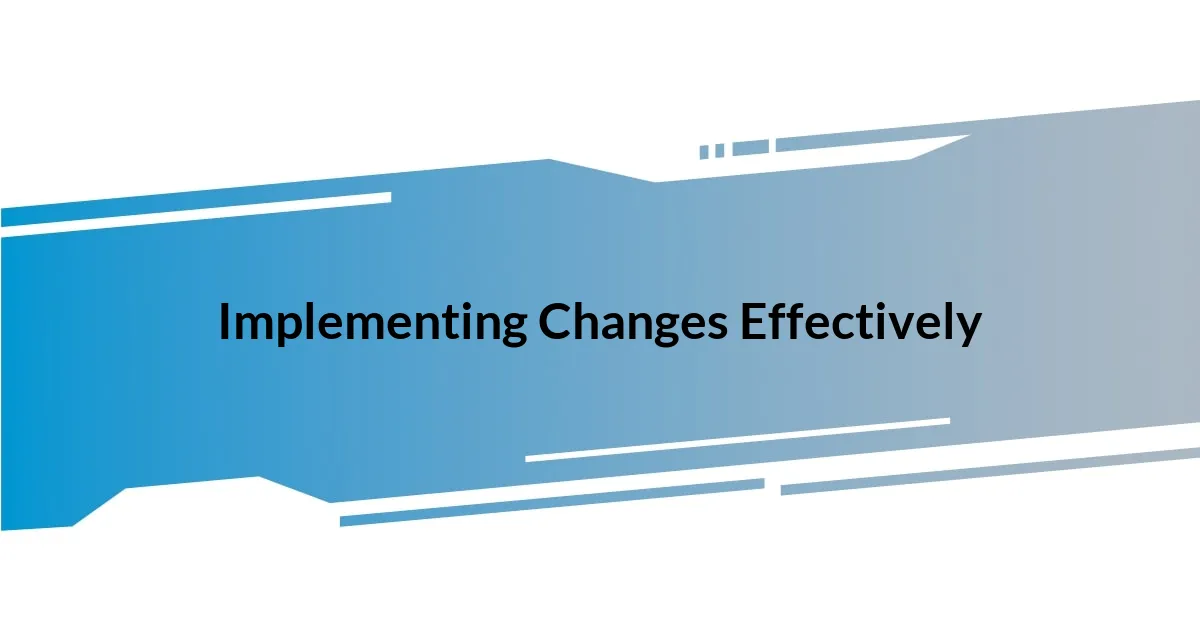
Implementing Changes Effectively
When implementing changes, I find it helpful to prioritize clear communication with everyone involved. For instance, there was a time when I had to shift the direction of a project mid-course due to unexpected feedback. I gathered the team and laid out the changes transparently, inviting input and concerns. This open dialogue not only eased anxieties but also ensured that everyone felt valued and listened to. It’s fascinating how just taking a moment to communicate effectively can transform uncertainty into a unified effort moving forward.
I also emphasize the importance of flexibility in execution. I recall a family event that I meticulously planned, only for several guests to cancel last minute. Instead of letting that derail my enthusiasm, I pivoted and offered a virtual gathering instead. To my surprise, this adjustment opened new avenues for interaction, as faraway family members could join in! It served as a beautiful reminder that embracing change can lead to moments filled with warmth, even in the face of plans not going as intended.
Have you ever worried about how others might react to changes you’re implementing? I certainly have. When I had to alter a long-nurtured community project, I was apprehensive. However, by involving the community in the decision-making process and exploring their feedback, I crafted a new approach that truly resonated with them. The outcome exceeded my expectations, showing me that collaboration fosters acceptance and innovation. It’s comforting to realize that together, we can weave our individual threads into something unexpectedly beautiful.
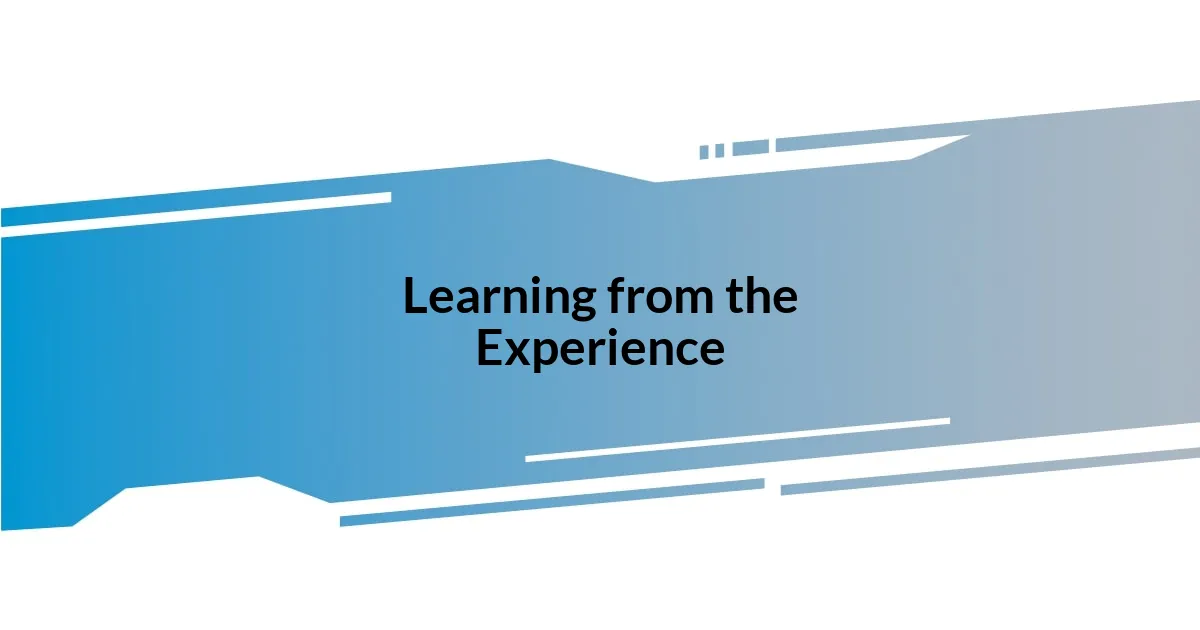
Learning from the Experience
There’s a profound lesson in every setback, don’t you think? I remember a time when I was set to attend a significant networking event, only to find out it was canceled last minute. Initially, I felt deflated—this was a golden opportunity! But instead of wallowing in disappointment, I reached out to a few contacts online and arranged virtual coffee chats. Those informal conversations turned out to be more enriching than any event could have offered, reminding me that sometimes, unexpected changes can lead us to personalize our connections in ways we never considered.
Reflecting on difficult moments has taught me the value of resilience. One particularly chaotic week, a crucial presentation I was preparing fell short due to a mix-up in timelines. I initially felt frustration bubbling up within me, but instead of dwelling on what went wrong, I took that time to rethink my approach. I restructured the content based on the feedback I received on the fly and ended up with an idea that sparked genuine interest. It was a powerful reminder that each experience serves as a teacher, showing us how to adapt and rise, often paving the way for greater creativity.
Have you ever had that ‘aha’ moment when failure shifted your perception? I certainly have. During a challenging team project, we reached a blockade due to conflicting visions. Tensions were high, and I could sense the frustration in the air. Instead of pushing forward stubbornly, we paused to share our experiences and insights openly. That discussion unveiled new perspectives and ultimately transformed our approach. It’s moments like these that highlight how learning from each experience not only enriches our journey but deepens our collaborative spirit.